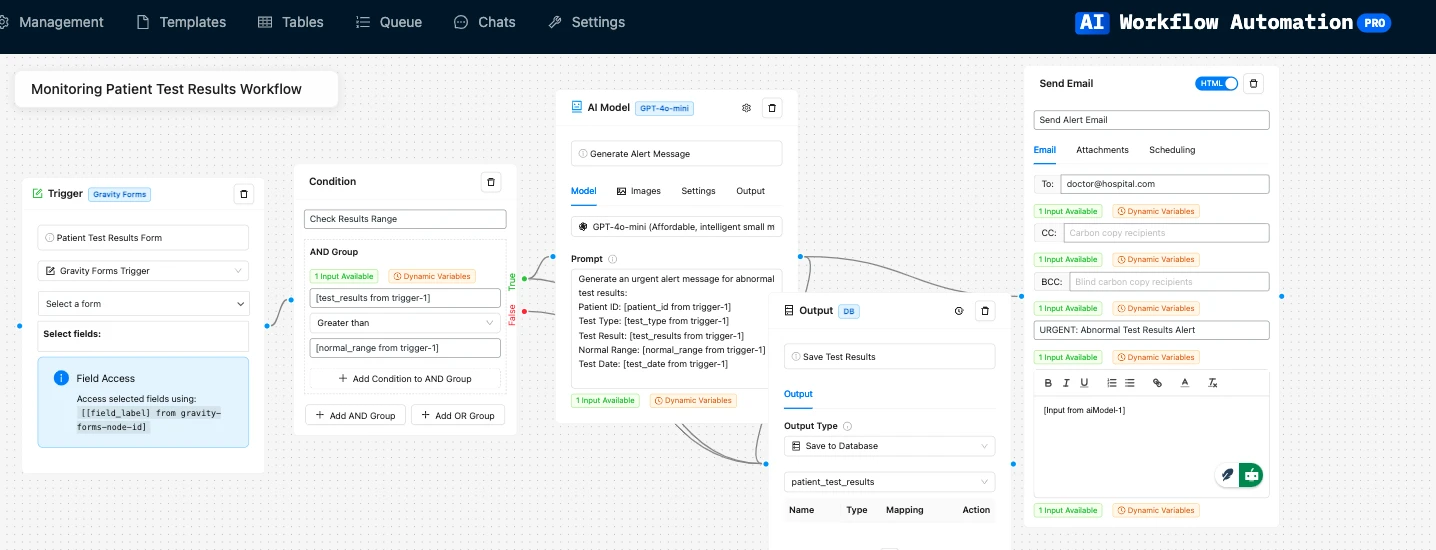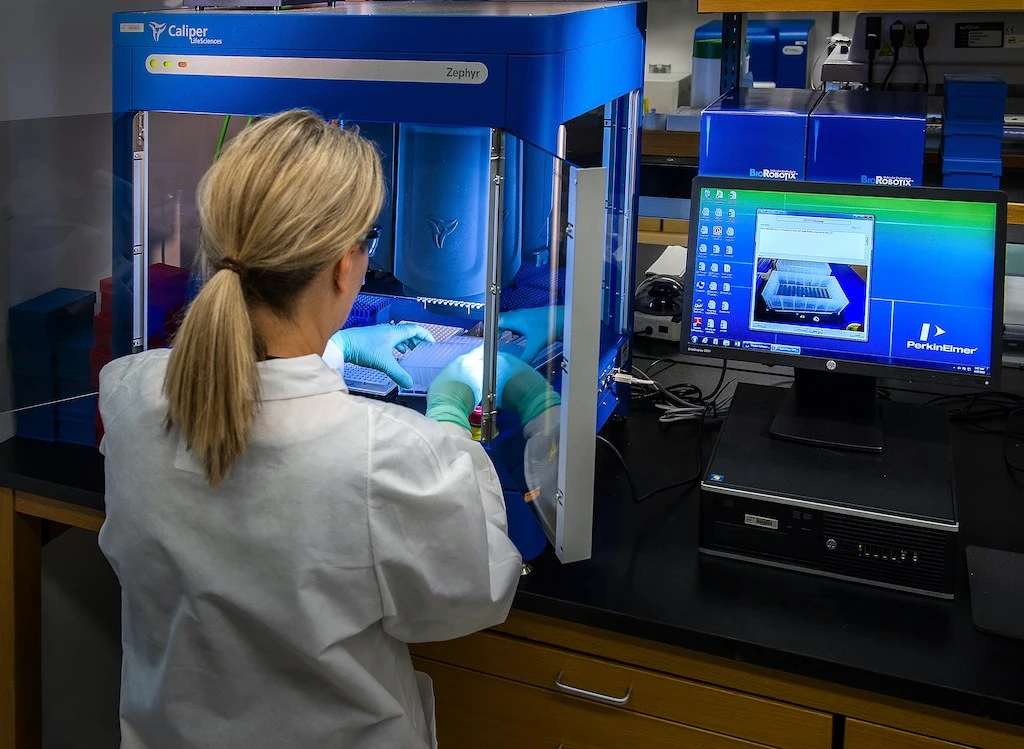How Agentic AI is Transforming Patient Data Management with the AI Workflow Automation
Imagine a world where hospitals run more smoothly, doctors have more time for patients, and patient care improves. This world is not far away, thanks to Agentic AI and the AI Workflow Automation WordPress plugin. This technology is changing patient data management in hospitals, making everything from patient intake to medical report analysis quicker and more efficient.
Hospitals all over the world are using Agentic AI to make things better for everyone involved. Whether it’s automating the intake process or sending out personalized follow-up messages, this technology is making a big difference. Let’s dive into how these technologies are being used in hospitals and see the real benefits they bring for patient data management.
AI and Data Analytics in Patient Data Management
AI and data analytics are revolutionizing how hospitals handle patient data management. They help create personalized care plans and predict health outcomes, which in turn improve patient care and save costs. According to a recent study, using AI in hospitals has led to a 10% improvement in customer experience within 6–12 months, reduced administrative costs by 5–10%, and enhanced quality standards by 20–25%.
Personalized Care and Tailored Engagement
With AI, hospitals can now provide care that’s specific to each person. This means doctors can use data to make treatment plans just for you. It’s like having a custom fit for your health needs. Hospitals using AI for personalized care have seen big improvements. Not only do patients feel more cared for, but the hospitals save money too.
Predictive Analytics and Risk Assessment
AI can also look at large amounts of data to predict future health issues. This means doctors can act before a big problem happens. McKinsey reports that predictive analytics can reduce healthcare costs by 15% while improving patient outcomes and satisfaction. This is a game-changer for hospitals looking to provide better care while keeping costs down.
Interoperability and Data Integration
One of the biggest challenges in healthcare is getting different systems to talk to each other. AI is helping solve this by improving interoperability, data integration, and patient data management. This means that patient data can be shared more easily across different systems and departments, making everyone’s job easier and improving patient care.
Open Ecosystem Approach
An open ecosystem means that different technologies can work together seamlessly. This approach allows hospitals to get a complete view of a patient’s health data, no matter which system it’s coming from. It leads to improved clinical efficiency, enhanced data accuracy, and more time for patient-centered care.
Vendor-Neutral Interoperability
By using common standards, different systems and devices can communicate without problems. This makes it much easier to share patient information across the hospital. It’s like everyone speaking the same language, which makes everything run smoother.
Remote Patient Monitoring and Hospital-at-Home Programs
AI is also helping hospitals take care of patients outside of the hospital walls. This is called remote patient monitoring (RPM). With RPM, doctors can keep an eye on patients at home, which can help prevent hospital readmissions and allow for earlier discharges after surgery.
According to the 2024 Future Health Index report, 41% of healthcare leaders plan to invest in AI-powered remote patient monitoring over the next three years. This shows how important this technology is becoming for the future of healthcare.
AI in Clinical Decision Support
AI is not just about managing data; it’s also about helping doctors make better decisions. By integrating AI with electronic health records (EHRs), hospitals can get more insights from patient data and predict possible health issues before they become serious. This means doctors can give the best care possible because they have all the information they need right at their fingertips.
Integration with Electronic Health Records (EHRs)
When AI is used with EHRs, it can process more data and find important details that might be missed otherwise. It can predict complications and flag patients who might benefit from specific care services. This is like having a super smart assistant that helps doctors make the best decisions for their patients.
Challenges and Considerations in Patient Data Management
While AI brings many benefits, there are also challenges to consider. Data privacy and security are huge concerns because hospitals handle sensitive patient information. There are also ethical questions about using AI in healthcare decision-making. And finally, integrating AI into existing hospital systems can be tricky and time-consuming.
How the AI Workflow Automation WordPress Plugin is Used in Hospitals
The AI Workflow Automation WordPress plugin is used to create specific workflows that help patient data management in hospitals more effectively. Here are some examples of how hospitals are using this plugin:

1. Automated Patient Intake Document Processing and patient data management
This workflow streamlines the intake process by automatically processing scanned patient intake forms. It uses AI to validate data and store it securely, reducing errors and saving time. For more details on how this workflow works, check out the documentation of AI Workflow Automation.
2. Patient Record Summary Generation
This workflow helps medical staff quickly generate comprehensive patient summaries. AI is used to create a concise overview of the patient’s history and add medical insights. Once generated, doctors can review the summary to ensure accuracy. Learn more about setting up this workflow here with Workflow Trigger Node.
3. Medical Document Classification and Routing
When medical documents are uploaded, this workflow automatically classifies and routes them to the appropriate department. This helps ensure that documents are handled quickly and efficiently. For detailed steps on how to implement this, visit Gravity Form Node Document.
4. Patient Follow-up Communication System
After an appointment, this workflow generates personalized follow-up messages for patients. It uses AI to tailor the communication based on the patient’s needs and preferences. This ensures consistent and effective communication. Find out more about this workflow here in the documentation of WordPress Core Trigger.
5. Medical Report Analysis and Alert System
This patient data management workflow monitors patient test results and uses AI to identify critical values. If a critical value is detected, an alert is sent to the medical staff, ensuring timely intervention. For more on how to set up this alert system, click here.
Conclusion
Agentic AI and the AI Workflow Automation WordPress plugin are transforming patient data management in hospitals. From improving personalized care to enhancing clinical decision-making, these technologies are making a big impact. While there are challenges to consider, the benefits they bring to patient care and hospital efficiency are undeniable. As AI continues to evolve, it will play an increasingly important role in the future of healthcare.



